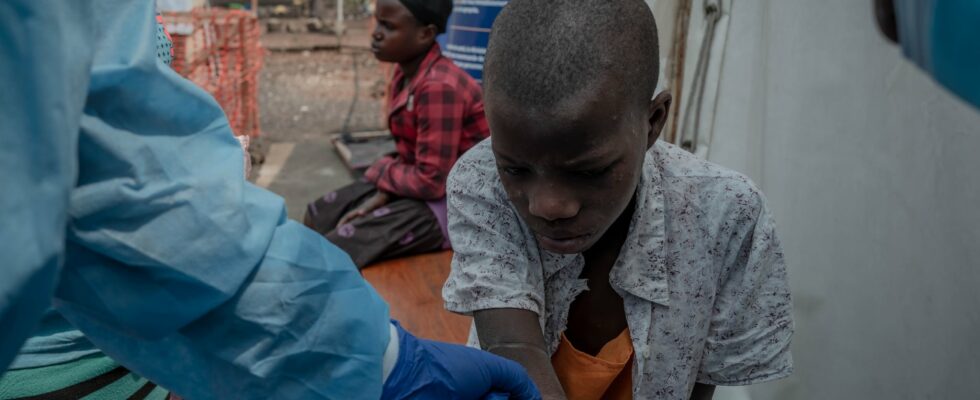We were expecting other health alerts at the end of summer 2024. We might as well confess, like the author of this column, that the health risk specialists were wrong. In the wake of the 2024 Paris Olympics, there was neither an explosion in the number of indigenous dengue cases nor an epidemic of Escherichia coli following swimming in the Seine, whether political or sporting. No, the news, the real alert, came from the Democratic Republic of Congo (DRC) with the emergence of this new variant, clade 1b, of the old monkeypox, now called Mpox.
The World Health Organization (WHO) has declared a public health emergency of international concern (PHEIC). The resigning French government has placed the health system on alert, in the face of an epidemic that is increasing in sub-Saharan Africa (14,957 cases in 2023, 18,837 for the first seven months of 2024 and four more countries affected: Burundi, Kenya, Uganda, Rwanda). The Directorate General of Health (DGS) has reactivated the plan put in place in 2022, where a first epidemic outside Africa had caused nearly 100,000 cases in 117 countries, mainly among men who have sex with men (MSM), and resulted in the death of 600 patients.
An additional factor of concern is the appearance of this new variant, clade 1b, first detected in the DRC in September 2023, then on rare occasions outside Africa, in Sweden and Thailand (as of September 4, 2024). A mutant (deletion of an OPG032 gene) that was not expected for DNA viruses which, unlike RNA viruses (HIV, Sars-CoV-2, etc.), mutate little.
Sexual transmission, a factor in the spread
Precautionary principle or real risk of a new Mpox pandemic? Certainly, no contamination by clade 1b has yet been recorded in France as of September 4, 2024. Since the 2022 epidemic, it is the clade 2 virus that has been circulating quietly, with a monthly number of reported cases varying between 12 and 26 between January and June 2024, according to Public Health France (SPF). To date, the reported cases are mostly benign and no deaths have been reported.
However, according to various experts (High Authority for Health, European Centre for Disease Prevention and Control, High Council for Public Health, etc.) and many specialists, there are at least four essential reasons for taking the WHO alert very seriously:
1) This is the second pandemic alert in two years for Mpox, including that of 2022 for an emerging, poorly understood virus, discovered in 1958 and whose first human cases outside Africa date back to 2003 (USA).
2) Sexual transmission, a recent and predominant phenomenon in the 2022 epidemic as in the current one of clade 1b in the DRC, is a faster and more effective factor of propagation for the extension to all countries, unlike intrafamily transmission or by animal contact (zoonosis) that we usually knew with the previous variants of Mpox.
3) There is a clear global vulnerability due to the very low population immunity since the cessation of smallpox vaccination (between 1975 and 1979), particularly among the most exposed population since the median age of Mpox cases in Europe (2022) was 35 years. Furthermore, the target population was not fully reached by the 2022 vaccination campaign (one or two doses, three in the immunocompromised): only 35% of MSM with multiple partners were immunized with a complete vaccination schedule, according to the Rapport au Sexe (ERAS/SPF) 2023 survey.
4) What has happened since the unexpected crisis of 2022? Almost nothing.
The number of doses of the Modified Ankara Vaccine (MVA-BN) vaccine from the Danish laboratory Bavarian Nordic, as well as the quantities of tecovirimat available, are still classified as “defense secret”. Will stocks be sufficient in the event of an extension of clade 1b? What resources will the Regional Health Agencies (ARS) deploy to be able to reach the most vulnerable populations and apply the new recommendations of the High Authority for Health (HAS) of September 2? Let us recall that the HAS recommends the administration of a booster dose for people vaccinated two years ago and the maintenance of the two complementary strategies used in 2022 (one preventive for unvaccinated or incompletely vaccinated people at high risk of exposure to the virus, and the other reactive for people in contact with identified cases).
What is the path to simpler vaccines to manufacture and adapt to variants/clades such as ANRm vaccines? Why doesn’t France take autonomy in the manufacture of such vaccines? What effective and coordinated international action is being put in place to vaccinate in sub-Saharan Africa? The European Union is said to have sent, through HERA, the agency dedicated to health emergencies, 100,000 vaccine doses to Kinshasa, a city of… 17 million inhabitants.
*Physician, professor at Sorbonne University, Gilles Pialoux is head of the infectious and tropical diseases department at Tenon Hospital (AP-HP).
.
